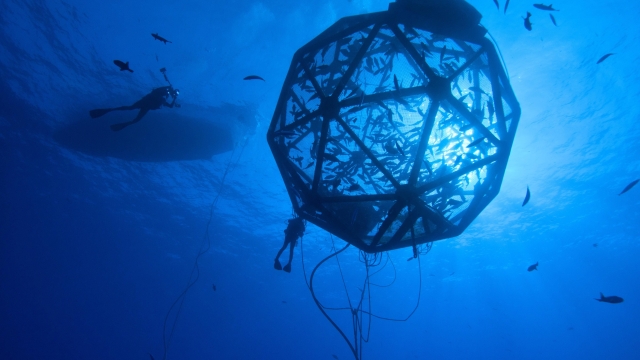
Revolutionizing the Deep: The Future of Aquaculture Technology Unveiled

As the global demand for seafood continues to rise, the aquaculture industry stands at a critical juncture. With advancements in technology and a growing emphasis on sustainability, the future of fish farming is no longer just about volume, but rather about efficiency and environmental stewardship. Innovations in aquaculture are not only transforming traditional practices but also paving the way for a more sustainable approach to feeding the world’s population.
At the forefront of these changes is The Rokter, an authoritative hub dedicated to aquaculture technology and sustainability insights. This platform offers a wealth of resources, including in-depth blog posts that delve into the latest trends, industry research that informs best practices, and a dedicated forum where aquaculture professionals can engage and share knowledge. By exploring these resources, stakeholders can stay informed and prepared to embrace the future of aquaculture as it evolves.
Innovative Technologies in Aquaculture
The aquaculture industry is experiencing a transformative shift driven by innovative technologies that enhance efficiency and sustainability. Precision farming tools, such as underwater drones and remote sensing devices, provide farmers with real-time data on water quality, fish health, and feeding patterns. These technologies allow for more accurate assessments of environmental conditions, leading to optimized growth rates and reduced waste. Increasing the use of such tools fosters a more responsible approach to fish farming, aligning with the industry’s sustainability goals.
Aquaculture systems are now integrating advanced robotics and automation, which streamline various processes within fish farms. Automated feeding systems utilize artificial intelligence to adjust feed delivery based on fish behavior and needs, minimizing overfeeding and improving feed conversion rates. Additionally, robotic systems are employed for routine maintenance tasks, reducing the labor intensity of operations and allowing farmers to focus on more strategic activities. The adoption of these high-tech solutions not only improves productivity but also enhances the overall resilience of farms.
Aquaculture health tips by Rokter
Renewable energy solutions are also making waves in aquaculture, promoting sustainable practices that help mitigate environmental impacts. Solar and wind energy power aquaculture operations, reducing reliance on fossil fuels and lowering operational costs. Furthermore, innovative water recycling systems are being developed to minimize water use and maximize resource efficiency. These technologies exemplify how the aquaculture sector is embracing a more sustainable future while simultaneously addressing the increasing global demand for seafood.
Sustainability Practices in the Industry
Sustainability is becoming an integral part of aquaculture practices as the industry seeks to minimize its environmental impact. Modern techniques such as recirculating aquaculture systems (RAS) significantly reduce water usage and waste discharge while maximizing productivity. These systems allow for the continuous recycling of water, which not only conserves this vital resource but also prevents the release of pollutants into surrounding ecosystems. By adopting such methods, aquaculture facilities can operate in a more environmentally friendly manner while still meeting the growing global demand for seafood.
Additionally, the industry is placing a greater emphasis on feed sustainability. Fish meal and fish oil have traditionally formed the backbone of aquaculture feeds, but overfishing has raised concerns about the sustainability of these resources. As a response, innovative alternatives are being developed, such as plant-based proteins and insect meals. These alternatives not only reduce reliance on marine resources but also contribute to a lower carbon footprint. By moving towards more sustainable feed options, aquaculture can lessen its impact on the ocean while ensuring fish health and growth.
Moreover, the adoption of integrated multi-trophic aquaculture (IMTA) systems is revolutionizing sustainable practices in the industry. By cultivating different species together in a synergistic manner, nutrients are efficiently recycled within the system. For example, waste produced by one species can serve as food for another, thereby enhancing overall productivity and reducing waste. This holistic approach not only optimizes resource use but also fosters biodiversity, helping to sustain both aquaculture operations and the surrounding ecosystems. As the industry evolves, practices like IMTA will be critical in promoting sustainability and resilience in aquaculture.
Expert Insights and Resources
The Rokter serves as a pivotal resource for anyone involved in aquaculture technology and sustainability. It curates a wealth of information that spans the latest advancements in the industry, helping professionals stay informed about emerging trends and best practices. Through informative blog posts, users can explore detailed analyses of innovative techniques that are transforming the aquaculture landscape and promoting sustainable practices.
In addition to insightful articles, The Rokter features a rich library of industry resources. These resources include research papers, case studies, and reports that highlight successful implementations of aquaculture technologies worldwide. By providing access to this information, The Rokter empowers professionals to make data-driven decisions that enhance productivity while minimizing environmental impacts.
The dedicated forum at The Rokter is a vibrant community where aquaculture professionals can collaborate and share their experiences. This platform encourages open discussions on challenges faced in the field and solutions that have proven effective. It fosters connections among industry experts, enabling the exchange of knowledge that can drive innovation and improve sustainability in aquaculture practices.
Community Engagement and Forum Discussions
The Rokter serves as a key platform for professionals in the aquaculture industry to connect, share insights, and collaborate on innovative solutions. By fostering a sense of community, The Rokter encourages individuals to bring their unique experiences and challenges to the forefront, stimulating discussions that can lead to meaningful advancements in aquaculture practices. Users are invited to engage with one another through informative threads, sharing best practices, and navigating the complex world of aquaculture technology together.
Integral to this community is the dedicated forum that allows users to post questions, share updates, and contribute their expertise. This exchange of knowledge is invaluable, as it helps address pressing issues faced by aquaculture professionals, ranging from sustainability challenges to technological advancements. Whether discussing the latest in fish farming techniques or debating the impact of regulatory changes, members gain insights that can inform their practices and drive progress within the industry.
In addition to forum discussions, The Rokter also hosts webinars and virtual meetups, further enriching the community experience. These interactive sessions provide opportunities for networking and professional development, allowing participants to learn from industry leaders and each other. As the aquaculture sector continues to evolve, community engagement through platforms like The Rokter will play a crucial role in shaping a sustainable and innovative future.



